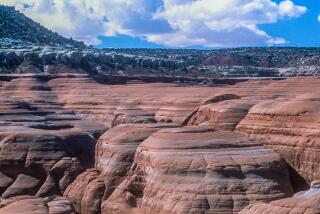Yellowstone Snowmobile Ban May Lift
WASHINGTON â The Bush administration agreed Friday to conduct a new environmental study that could lead to a reversal of former President Clintonâs decision to ban snowmobiles in Yellowstone National Park.
The decision settled a lawsuit with snowmobile makers, outdoor enthusiasts and the state of Wyoming. If approved by a federal court judge in Wyoming, it could lift the ban, which was to take effect in the winter of 2003. The National Park Service will now conduct a supplemental environmental impact study of winter vehicular use in Yellowstone.
The dispute over use of snowmobiles in Yellowstone resonates far beyond the boundaries of the nationâs oldest national park. Although snowmobiles are allowed in a number of other national parks, advocates fear that the ban in Yellowstone could lead to restrictions elsewhere. In addition, Yellowstone is seen as a key battleground for an expanding regulatory struggle over access to protected public lands, pitting environmental activists against industry groups and recreational enthusiasts.
The industry lawsuit was filed in response to Clintonâs decision to ban snowmobiles from Yellowstone just before he left office following a three-year debate on the issue.
âThis administration feels strongly that greater local input, new information, scientific data and economic analysis and wider public involvement can only lead to better, more-informed decisions,â Interior Department spokesman Mark Pfeifle said Friday in announcing the settlement agreement.
The move represents a significant victory for snowmobile manufacturers and enthusiasts, who claim that new technologies that make the motorized vehicles more environmentally friendly were ignored in previous studies.
Among the 139,123 visitors to Yellowstone last winter, 83,548 of them came aboard 66,728 snowmobiles.
The decision was widely viewed as signaling the Bush administrationâs intent to eventually lift the ban imposed by the Clinton team.
âWeâre thrilled,â said Christine Jourdain, executive director of the American Council of Snowmobile Assns. âWe have said all along that the last process was flawed. This will allow us to get good science in there, instead of the misinformation that was so widely used in the last one.â
Environmental groups and Yellowstone conservationists assailed the decision, deeming it an example of the Bush administrationâs inclination to favor industry interests over efforts to protect the environment and wildlife--such as Yellowstoneâs famed bison--from pollution and harm.
âClearly the Bush administration is backpedaling because it is paying more heed to industry and special-interest groups than to the majority of Americans who want to see the environment protected, especially our national treasures,â said Steven Bosak of the National Park Conservation Assn.
The Clinton administrationâs decision to ban snowmobiles at the park followed more than 20 public hearings and reviews of nearly 50,000 letters by supporters and opponents of the proposed move.
Greater Yellowstone Coalition spokesman Jon Catton said the extensive public dialogue makes Fridayâs action all the more disturbing, calling it âa sad day for Yellowstone and a sad day for government of, by and for the people.â
Snowmobile supporters questioned the validity of the studies and public comment procedures.
âWe expect to prove that the studies on which the Clinton administration based its ban were flawed and highly prejudiced,â said Ed Klim, president of the International Snowmobile Manufacturers Assn. âWhatâs more, in the previous decision-making process, the public was prevented from participating as fully as the law allows. The agreement helps ensure that that wonât happen this time around.â
A lawyer who represents a coalition of environmental groups that favor the snowmobile ban called the industryâs claims a âcommon tacticâ to overturn the ban.
âThey are just upset with the result,â said Earthjustice attorney Abigail Dillen. âItâs not a complaint with the process, itâs a complaint with the decision, and itâs a real perversion of our environmental laws to try to reverse these decisions on the grounds that the public process was inadequate.â
Representatives of both sides cited polling data supporting their position. Klim said a Southwest Research study found that nearly 80% of Americans back snowmobile use in national parks, while only 11% support a ban. Catton claimed that a Zogby poll conducted in May showed that two-thirds of likely voters endorsed the park serviceâs decision to phase out snowmobiles, and 70% of those would still support a ban even if the vehicles produced less pollution and noise.
Jourdain acknowledged that her group expects the new study to result in the cancellation of the ban. Environmental lawyer Dillen indicated that that was a foregone conclusion.
âThe industry must be sure that they are going to get the result they like, or otherwise they would never reach this agreement with the government,â Dillen said. âIt reflects the sweetheart relationship between the industry and the Interior Department on this issue.â
Several environmentalists characterized the snowmobile settlement as the latest in a series of anti-environmental actions by the Bush administration.
*
Associated Press contributed to this story.
More to Read
Sign up for Essential California
The most important California stories and recommendations in your inbox every morning.
You may occasionally receive promotional content from the Los Angeles Times.










